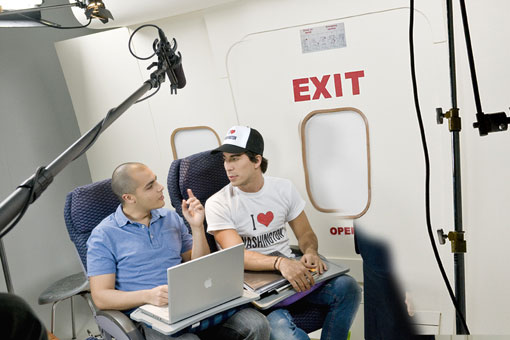If you visit Andrés Moreno’s blog, you’ll see a list of books he’s “recently enjoyed.” Among them are Globish: How the English Language Became the World’s Language, and Mastering the VC Game. The list not only reflects Moreno’s passion for English as a global language, but his entrepreneurial drive to turn that passion into profits.
Last June, both the passion and the drive paid off when the Caracas-born Moreno, 28, launched Open English, a Web-based language school that promises “to reinvent the English-language learning experience.”
Lots of programs offer specialized English instruction, but Open English is different, says Moreno, because “we provide an integrated solution to reaching fluency.” Not only does the school offer live virtual classroom sessions, it gives students interactive tools that keep them engaged—for example, voice recorders and spell-checkers to help evaluate their pronunciation and writing—and various multimedia content, including educational videos and audio podcasts.
In 2008, Open English partnered with the Venezuelan media and entertainment giant Cisneros Group to produce a 60-episode television series called English Highway, which follows a group of young professionals as they use English in their daily lives and offices and ultimately land their dream jobs. There are beginner, intermediate and advanced series, and viewers can practice their skills through mid-episode speaking drills.
Open English was not Moreno’s first foray into the English-language instruction field. In 2004, he co-founded Optimal English, which provided one-on-one language instruction to Latin American executives of Fortune 500 companies. But its high cost gave it limited appeal. Moreno wanted to tap into the market of ambitious people needing to learn English to advance their careers, but who could not afford to travel to brick-and-mortar classrooms.
Moreno found his inspiration—and a model—in the burgeoning popularity of social media sites like MySpace and Facebook. Starting in 2007 and working largely out of his Caracas apartment, he and a group of friends developed a learning platform for Open English. Some $2 million from Silicon Valley angel investors helped him bring the product to market.
Since it appeared—in 2008 in Venezuela and 2010 across Latin America—Open English has been a clear hit. Over 7,500 students have signed up, the majority between 25 and 35 years old. Its strongest markets are Venezuela, Colombia and Mexico, and although most students come from major metropolitan areas, “a surprising number are coming from places we’ve never heard of,” says Moreno.
Open English charges $1,000 for its year-long course. Students receive a curriculum tailored to their baseline knowledge of English (50 percent already have low-to-intermediate English skills) and their profession, interests and goals. “The 17-year-old studying for her TOEFL [Test of English as a Foreign Language] gets a very different program of instruction than the P&G executive,” says Moreno. “Personal study advisors” then guide them through the course.
Live classes, which average fewer than 5 students per class, are offered every hour on the hour, twenty-four-seven. Teachers—all native English speakers, bilingual and tech-savvy—are based around the world and have backgrounds teaching English as a Second Language (ESL).
Moreno is just beginning. He plans to expand to other untapped populations—including, later this year, Brazil, which represents 40 percent of Latin America’s broadband connections.
What drives Moreno? The son of a Venezuelan diplomat, he had lived in eight countries and learned Spanish, English, Slovenian, and Italian by the time he was 15. “All that traveling I did as a kid gave me a real passion for languages and communicating,” he says.
To learn more about Moreno’s work and his company, you can visit his blog and the Open English website.





